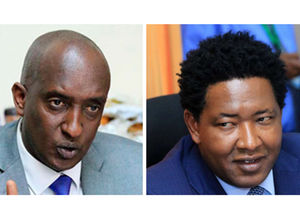
Governors Kenneth Lusaka (Bungoma), Anne Waiguru (Kirinyaga) and James Orengo (Siaya). They have opposed a Bill sponsored by Senator Raphael Chimera (inset).
Sitting and former governors are up in arms over a proposed constitutional amendment to block them from contesting for MP or MCA positions for at least five years immediately after leaving office.
The draft Constitution of Kenya (Amendment) Bill, 2023, seeks to impose the restriction on the politicians, either after serving their two- term limit or after one term.
If the Bill by nominated Senator Raphael Chimera is enacted, second-term governors who will leave office in 2027 and plan to contest National Assembly or Senate seats would be the first casualties.
The Bill targets to amend Articles 99 and 193 of the constitution and sections 24 and 25 of the Elections Act that provide the qualifications to vie for MP and MCA positions.
However, Kirinyaga governor and Council of Governors (CoG) chairperson Anne Waiguru, Bungoma Governor Kenneth Lusaka and Siaya Governor James Orengo have read mischief in the Bill. Ms Waiguru and Mr Lusaka are serving their second terms while Mr Orengo is in his first term.
Former governors currently serving as senators Ali Roba (Mandera) and Jackson Mandago (Uasin Gishu) and former Meru Governor Peter Munya have also opposed the Bill.
“If such a law is passed it would simply be unconstitutional,” Ms Waiguru said. “The constitution is a rights granting document. It allows every Kenyan to participate at all levels of political activity including standing for elections for any seat,” said Ms Waiguru.
She added: “If there is a conflict that arises by one going for another seat, there are ways to deal with that without violating people’s political or fundamental rights.”
Mr Orengo termed the proposed law “transactional and opportunistic”. “It is not premised on the letter and spirit of the constitution.” he added.
“In the House of Commons, those who have served as prime minister, also serve as back benchers,” argued Mr Orengo, noting that a person who has served as governor can still serve as Senator. “I would not mind if it’s a pure parliamentary system. The thought to amend the constitution should be based on values and principles enshrined in the constitution.”
Mr Lusaka argued that the proposal is discriminatory and unconstitutional “because it infringes on the political rights of the people as provided for under the Bill of Rights in chapter four of the constitution.”
“Why would they want to deny Kenyans an opportunity to elect leaders they want? If the leaders still want to serve in other positions, let Kenyans decide at the ballot,” said Mr Lusaka.

Nominated Senator Raphael Mwinzago Chimera addresses journalists in his office in Nairobi on August 10, 2023.
But Makueni Governor Mutula Kilonzo Jnr maintained that governors ending up as senators is an “absolute” conflict of interest that goes against the national values and principles of governance”.
“This is a terrible one that no one has ever thought about. It is a moral question: whether you can sit in the judgment of your own cause.”
The Senate’s key role is to provide oversight over the 47 county governments.
Mr Lusaka was first elected Bungoma governor in 2013 and then lost the seat to Mr Wycliffe Wangamati in 2017. In the 2022 elections, he recaptured the seat, meaning that he is ineligible to seek another term based on Article 180 (7) of the constitution.
However, governors who recaptured their seats in the last elections are planning a petition to the constitutional court to argue that the two-term limit only applies to consecutive terms.
Mr Chimera wants Article 99 of the constitution amended by inserting a new paragraph that states that a person is disqualified from being elected MP if he or she is a county governor or has at any time within the five years immediately preceding the election, held office as a governor.
Also Read: Why counties go broke
Under Article 193 of the constitution, Mr Chimera wants a new provision to disqualify from being elected MCA a person who has at any time within the five years immediately preceding the election, held office as a governor.
Once published, the Bill will be introduced in the House and referred to the relevant committee immediately but it will take 90 days to mature before it is debated. Unlike other ordinary Bills, constitutional amendment Bills are not subject to amendments- it is passed or rejected as published.
Mr Roba and Mr Mandago said the proposal it is undemocratic.
“It is impractical and discriminatory legislation. It will not see the light of the day,” said Mr Roba.
“It is unconstitutional!” said Mr Mandago.
Mr Roba and Mr Mandago are the pioneer governors of their counties and served two terms before seeking senatorial positions in 2022 polls.
In the Senate, Mr Mandago chairs the Health committee., while Mr Roba chairs the Finance and Budget committee and is a member of the powerful Senate Business Committee that schedules business to be transacted in the House on a weekly basis, including County Public Accounts and Investment Committee reports on the 47 counties.
By virtue of their chairmanships, they sit in the Liaison Committee of the Senate that guides and co-ordinate the operations, policies and mandates of all committees. It also deliberates on and apportions the annual operating budget among the committees.

Uasin Gishu Senator Jackson Mandago when he appeared before the Nakuru Law Courts on August 17, 2023.
Mr Mandago was last year charged with corruption and embezzlement of funds in the Finland and Canada scholarships scandal that took place during his time as governor.
Also Read: SRC, governors fight over Sh2.3bn exit pay
Mr Munya, who served between 2013 and 2017, before losing out to Mr Kiraitu Murungi in 2017, has termed the proposal mischievous.
“The promoter of the Bill needs to answer the following questions: What mischief is the Bill solving? What gap in our constitutional democracy is it filling or which fundamental tenets is it improving given that the right to run for any office is a fundamental right?” Mr Munya asked.
He added: “Paying his logic with the same coin, can he also say that no MP or MCA should be allowed to run for the office of county governor five years after leaving office?”
Mr Chimera argues that county governors “in the course of their duties, have to account to the county assemblies and the Senate for any financial and administrative decisions made”.
“Barring immediate former county governors from vying for elections will allow for any ongoing accountability processes related to administration and financial management affairs of the county to be completed, as these would have a bearing on the suitability of the former county governor to hold any other elective position,” he says.
He notes that since the Senate and county assemblies directly exercise oversight over county governments, through examining their audit reports and holding governors accountable for their decisions, having former governors sit in the two legislatures would lead to conflict of interest and interfere in their decision-making process.
The senator reasons that the effect of the Bill would be that oversight bodies would have adequate time to inquire into any matters arising from the tenure of a previous holder of the office of governor without interference from them.

Former Meru Governor Peter Munya.
He also notes that voters would have a reference point in making an informed choice on the candidate’s suitability for another elective office since all accountability processes would have been completed after five years.
Former Attorney-General Githu Muigai faults the governors’ ambitions saying it is “a terrible conflict of interest”. He argues that it is a grey area in the constitution that needs to be addressed.
“A plain reading of the constitution does not prohibit county governors from offering themselves to be elected for other seats including in the Senate. But this is a lacuna that needs to be attended to in future constitutional amendments,” says Prof Muigai.
The former AG notes that a governor who has become a senator is like an individual who has succeeded themselves, “which raises ethical issues that on their leadership and integrity”. “The question of what is the true intention of term limit, therefore suffices.”
However, Dr Bobby Mkangi, a former member of the Committee of Experts that drafted the 2010 constitution, says that there is no cause for worry as the question of conflict of interest is sufficiently dealt with within the Senate Standing Orders.
Rarieda MP Otiende Amollo agrees with Dr Mukangi that there should be no cause for alarm as conflict of interest is sufficiently dealt with in the Senate Standing Orders and cannot therefore, be used to lock former governors out.
“Conflict of interest against former governors who have been elected senators can only be imagined but not real. Nothing stops the senate from summoning a senator who was previously a county governor for questioning on a matter before the House,” the MP adds.
Dr Mukangi notes that the biggest responsibility lies with the people to decide who their leaders are.
“I don’t see any challenge here. If anything, the people have the original mandate to elect their leaders. The rules that govern business in Parliament provide that if a member of either House has a conflict of interest then the best they can do is to declare the interest and recuse themselves from the matter,” he says .
An attempt by then Trans Nzoia Senator Michael Mbito to amend the Elections Act to bar governors from vying as senators within 10 years of serving their terms flopped in the Senate in 2020. The Bill did not go beyond the Senate’s Justice and Human Rights Committee, which found the it unconstitutional on the basis that it sought to limit the political rights of the governors.
“Why a county governor would be allowed to vie for other positions after serving their two terms, even though the constitution is silent on it, is a matter that ought to be corrected,” Dr Mbito said then, noting that if the President retires after serving two terms, so should county governors.
The governor position, hierarchically and politically, is higher than that of senator. It is a general principle in politics that one can only ascend higher and if not, retire.









